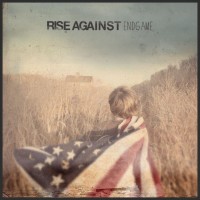On the title of track of Endgame, Tim Mcllrath describes a world where rotting bodies pile up in fields, pleas are left unanswered by absent gods, and then finally, when things seem at their most dim, the last bit of oil runs out and the modern age comes to an end. He doesn't offer conjectures as to how the end of civilization came about, nor does he point blame at anyone for the collapse of life as we know it. In fact, he doesn't even say whether the apocalypse is good or bad. Through their icy description of the onrushing apocalypse, It seems that necessity has somewhat shaped Rise Against's view of the modern world and enabled them to cut their most multi-faceted record to date.
On 2008's Appeal to Reason, the group aimed squarely at the fallout of the previous presidential administration, focusing on how the Iraqi war had affected veterans and those at home alike. But here there seems to be less condemnation in the group's tone than a dismissal of the human race in its entirety. "Disparity by Design" roars, "We pulled on these bootstraps so hard they broke!" while questioning whether the current system of helping the down and out is elevating them to a higher station or keeping them in their place. On "Make It Stop (December's Children)", the band laments the recent rash of suicides caused by gay teens that have been bullied and proclaims that it has to stop, more concerned on the current problem than what caused it.
Produced by Bill Stevenson, Endgame continues Rise Against's trend of energetic, anthemic punk. At times the heavy production can be a little too slick, stripping away some of the group's passion, which is quite clearly earnest. But the heavy in-studio contemplation pays off when the group sneaks in unusual elements that add extra backbone to the group's sound without being distracting. "Midnight Hands" masterfully blends a metal riff into the layers of sound without sounding like the group is trying to be metal, and "Make It Stop" has a spacey, dance-influenced intro that deftly adds variety to melodic punk while seamlessly sliding into the song proper.
Most interestingly, the group not only contemplates the human condition, but their own as well. The album's most charged line comes on "Architects", where Mcllrath pleads, "Remember when you were young and you wanted to set the world on fire / somewhere deep down I know you do," warping a similar line from Against Me!'s "I Was a Teenage Anarchist". Mcllrath then plays a variation on the theme with "Remember when we were young, and we wanted to start the world on fire / 'cause I'm still young and I still do." The parallels between Rise Against and Against Me! are already clear: Each band started on an indie label only to traverse to a major, and then suffer the inevitable backlash from old fans as well as earn praise from those unaware of each group's storied past. What's not clear is McIIrath's intention. He could be firing a shot at Against Me!'s Tom Gabel, but he could also be supporting a frequently attacked contemporary by arguing that he's the same as he always was.
When Rise Against uses specific instances to attack a broader topic, the group is at its most effective. However, sometimes they slip into the clichéd or bland: On "Satellite", flying stands in as a metaphor for leaving the parents' nest. But while there are broad admonishments throughout the album that seem to lament a nameless feeling, there album's core concept of "the end" ties the more generalized grievances with the specific ones, allowing the album to have specific themes, if not concept.
The single that announced the album, "Help Is on the Way" uses the misfeasance of FEMA to suggest that Katrina might just be the tip of the iceberg–an omen of biblical proportions. Interestingly, though, Rise Against doesn't suggest that the oncoming rapture is avoidable, but rather view it with a detached observance–probably because, at this point, it's the only thing left that they can do.
